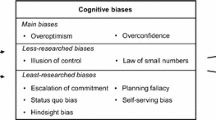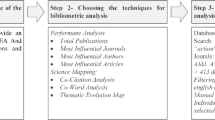Abstract
This paper reports on a study testing whether and how the use of effectuation and causation logics influences deliberate practice in businesses started by microfinance borrowers (“micro-entrepreneurs”) in Sri Lanka. Using mixed methods, we surveyed clients of a large Sri Lankan microfinance institution and deepened findings from the survey through 24 interviews. In this way, we identified specific patterns of relationships between principles of the two logics and five elements of deliberate practice identified in the expertise literature from cognitive science. We found that both effectual and causal logics (but not effectuation alone) facilitate deliberate practice, an important result since deliberate practice could be expected to help micro-entrepreneurs gain business and entrepreneurial expertise. We also found interesting patterns in the links among effectuation and causation and specific elements of deliberate practice. In particular, one effectuation principle—acknowledging and leveraging the unexpected—impacted all five elements of deliberate practice, suggesting that learning to manage uncertainty is a central task—perhaps the central task—in becoming an entrepreneur. By contrast, causation influenced elements of deliberate practice linked to “venture-building” or “entrepreneuring,” and not the more personal elements linked to seeing oneself as an entrepreneur. As expected from the literature on expertise, deliberate practice was more likely to occur in earlier stages of venturing by younger, less-experienced entrepreneurs. Findings not only offer avenues for future research into deliberate practice in entrepreneurship but also suggest new ways for microfinance institutions to help their clients move toward entrepreneurial expertise.
Similar content being viewed by others
References
Alvarez, S. A., & Barney, J. B. (2014). Entrepreneurial opportunities and poverty alleviation. Entrepreneurship Theory and Practice, 38(1), 159–184.
Amit, R., Glosten, L., & Muller, E. (1993). Challenges to theory development in entrepreneurship research. Journal of Management Studies, 30(5), 815–834.
Andersson, S. (2011). International entrepreneurship, born globals and the theory of effectuation. Journal of Small Business and Enterprise Development, 18(3), 627–643.
Banerjee, A., & Duflo, E. (2011). Poor economics: a radical rethinking of the way to fight global poverty. New York: BBS Public Affairs.
Banville, D., Desrosiers, P., & Genet-Volet, Y. (2000). Translating questionnaires and inventories using a cross-cultural translation technique. Journal of Teaching in Physical Education, 19(3), 374–387.
Baron, R. A. (2009). Effectual versus predictive logics in entrepreneurial decision-making: differences between experts and novices; does experience in starting new ventures change the way entrepreneurs think?; perhaps, but for now, “caution” is essential. Journal of Business Venturing, 24(4), 310–315.
Baron, R. A., & Henry, R. A. (2010). How entrepreneurs acquire the capacity to excel: insights from research on expert performance. Strategic Entrepreneurship Journal, 4(1), 49–65.
Berends, H., Jelinek, M., Reymen, I., & Stultiëns, R. (2013). Product innovation processes in small firms: combining entrepreneurial effectuation and managerial causation. Journal of Product Innovation Management, 31(3), 616–635.
Buckley, R., & Caple, J. (2009). The theory and practice of training (6th ed.). London: Kogan Page.
Chandler, G. N., DeTienne, D. R., McKelvie, A., & Mumford, T. V. (2011). Causation and effectuation processes: a validation study. Journal of Business Venturing, 26(3), 375–390.
Charness, N., Tuffiash, M., Krampe, R., Reingold, E., & Vasyukova, E. (2005). The role of deliberate practice in chess expertise. Applied Cognitive Psychology, 19(2), 151–165.
Chetty, S., Ojala, A., & Leppäaho, T. (2015). Effectuation and foreign market entry of entrepreneurial firms. European Journal of Marketing, 49(9–10), 1436–1459.
Creswell, J. W. (2003). Research design: qualitative, quantitative, and mixed methods approaches (2nd ed.). Thousand Oaks: Sage.
Daniel, E. M., Domenico, M. D., & Sharma, S. (2015). Effectuation and home-based online business entrepreneurs. International Small Business Journal, 33(8), 799–823.
Davidsson, P. (2004). Researching entrepreneurship. New York: Springer.
De Vaus, D. A. (2014). Surveys in social research (6th ed.). Sydney: Allen & Unwin.
Dew, N. (2009). Serendipity in entrepreneurship. Organization Studies, 30(7), 735–753.
Dew, N., Sarasathy, S., Read, S., & Wiltbank, R. (2009). Affordable loss: Behavioral economic aspects of the plunge decision. Strategic Entrepreneurship Journal, 3(2), 105–126.
Dew, N., Ramesh, A., Read, S., & Sarasvathy, S. D. (2018). Toward deliberate practice in the development of entrepreneurial expertise: the anatomy of the effectual ask. In K. A. Ericsson, R. R. Hoffman, & A. Kozbelt (Eds.), The Cambridge handbook of expertise and expert performance (pp. 389–412). New York: Cambridge University Press.
Downey, R. G., & King, C. V. (1998). Missing data in Likert ratings: a comparison of replacement methods. Journal of General Psychology, 125(2), 175–191.
Ericsson, A. K. (2006). The influence of experience and deliberate practice on the development of superior expert performance. In A. K. Ericsson, N. Charness, P. J. Feltovich, & R. B. Hoffman (Eds.), The Cambridge handbook of expertise and expert performance (pp. 685–705). Cambridge: Cambridge University Press.
Ericsson, A. K. (2008). Deliberate practice and acquisition of expert performance: a general overview. Academic Emergency Medicine, 15(11), 988–994.
Ericsson, A. K., Krampe, R. T., & Tesche-Romer, C. (1993). The role of deliberate practice in the acquisition of expert performance. Psychological Review, 100(3), 363–406.
Evald, M. R., & Senderovitz, M. (2013). Exploring internal corporate venturing in SMEs: effectuation at work in a new context. Journal of Enterprising Culture, 21(3), 275–299.
Fisher, G. (2012). Effectuation, causation, and bricolage: a behavioral comparison of emerging theories in entrepreneurship research. Entrepreneurship: Theory and Practice, 36(5), 1019–1051.
Fuller, C. M., Simmering, M. J., Atinc, G., Atinc, Y., & Babin, B. J. (2016). Common methods variance detection in business research. Journal of Business Research, 69(8), 3192–3198.
Gabrielsson, M., & Gabrielsson, P. (2013). A dynamic model of growth phases and survival in international business-to-business new ventures: the moderating effect of decision-making logic. Industrial Marketing Management, 42(8), 1357–1373.
Harmeling, S., & Sarasvathy, S. D. (2013). When contingency is a resource: educating entrepreneurs in the Balkans, the Bronx, and beyond. Entrepreneurship Theory and Practice, 37(4), 713–744.
Hodges, N. J., Starkes, J. L., & MacMahon, C. (2006). Expert performance in sport: a cognitive perspective. In A. K. Ericsson, N. Charness, P. J. Feltovich, & R. B. Hoffman (Eds.), The Cambridge handbook of expertise and expert performance (pp. 471–488). Cambridge: Cambridge University Press.
Hulland, J., Baumgartner, H., & Smith, K. M. (2017). Marketing survey research best practices: evidence and recommendations from a review of JAMS articles. Journal of the Academy of Marketing Science, 1–17.
Keith, N., Unger, J. M., Rauch, A., & Frese, M. (2016). Informal learning and entrepreneurial success: a longitudinal study of deliberate practice among small business owners. Applied Psychology, 65(3), 515–540.
Kevane, M., & Wydick, B. (2001). Microenterprise lending to female entrepreneurs: sacrificing economic growth for poverty alleviation. World Development, 29(7), 1225–1236.
Knight, F. H. (1921). Risk, uncertainty, and profit. Boston: Hart, Schaffner & Marx; Houghton Mifflin Company.
Kutzhanova, N., Lyons, T. S., & Lichtenstein, G. A. (2009). Skill-based development of entrepreneurs and the role of personal and peer group coaching in enterprise development. Economic Development Quarterly, 23(3), 193–210.
Lingelbach, D., Sriram, V., Mersha, T., & Saffu, K. (2015). The innovation process in emerging economies: an effectuation perspective. International Journal of Entrepreneurship and Innovation, 16(1), 5–17.
Maine, E., Soh, P.-H., & Dos Santos, N. (2015). The role of entrepreneurial decision-making in opportunity creation and recognition. Technovation, 39-40, 53–72.
McMullen, J. S., & Shepherd, D. A. (2006). Entrepreneurial action and the role of uncertainty in the theory of the entrepreneur. Academy of Management Review, 31(1), 132–152.
Ministry of Finance Sri Lanka (2014). Annual report 2014, viewed 25 May 2017. http://www.treasury.gov.lk/documents/10181/12870/2014/a9d95930-b101-40dc-9b1b-cd1ebb2a82ba?version=1.0. Accessed 25 May 2017
Minniti, M., & Bygrave, W. (2001). A dynamic model of entrepreneurial learning. Entrepreneurship Theory and Practice, 25(3), 5–16.
Molina-Azorín, J. F., López-Gamero, M. D., Pereira-Moliner, J., & Pertusa-Ortega, E. M. (2012). Mixed methods studies in entrepreneurship research: applications and contributions. Entrepreneurship and Regional Development, 24(5/6), 425–456.
Mueller, B. A., & Shepherd, D. A. (2016). Making the most of failure experiences: exploring the relationship between business failure and the identification of business opportunities. Entrepreneurship: Theory and Practice, 40(3), 457–487.
Neergaard, H., & Ulhoi, J. P. (2007). Introduction: methodological variety in entrepreneurship research. In H. Neergaard & J. P. Ulhoi (Eds.), Handbook of qualitative research methods in entrepreneurship (pp. 1–14). Cheltenham: Edward Elgar.
Noice, H., & Noice, T. (2006). Artistic performance: acting, ballet, and contemporary dance. In A. K. Ericsson, N. Charness, P. J. Feltovich, & R. B. Hoffman (Eds.), The Cambridge handbook of expertise and expert performance (pp. 489–503). Cambridge: Cambridge University Press.
Norman, G., Eva, K., Brooks, L., & Hamstra, S. (2006). Expertise in medicine and surgery. In A. K. Ericsson, N. Charness, P. J. Feltovich, & R. R. Hoffman (Eds.), The Cambridge handbook of expertise and expert performance (pp. 339–353). Cambridge: Cambridge University Press.
Nummela, N., Saarenketo, S., Jokela, P., & Loane, S. (2014). Strategic decision-making of a born global: a comparative study from three small open economies. Management International Review (MIR), 54(4), 527–550.
Podsakoff, P. M., MacKenzie, S. B., Lee, J. Y., & Podsakoff, N. P. (2003). Common method biases in behavioral research: a critical review of the literature and recommended remedies. Journal of Applied Psychology, 88(5), 879–903.
Rahman, R., & Nie, Q. (2011). The synthesis of Grameen Bank microfinance approaches in Bangladesh. International Journal of Economics and Finance, 3(6), 207–218.
Read, S., & Sarasvathy, S. D. (2005). Knowing what to do and doing what you know: effectuation as a form of entrepreneurial expertise. The Journal of Private Equity, 9(1), 45–62.
Reymen, I. M., Andries, P., Berends, H., Mauer, R., Stephan, U., & van Burg, E. (2015). Understanding dynamics of strategic decision making in venture creation: a process study of effectuation and causation. Strategic Entrepreneurship Journal, 9, 351–379.
Sarasvathy, S. (2001). Causation and effectuation: toward a theoretical shift from economic inevitability to entrepreneurial contingencies. Academy of Management Review, 26(2), 243–263.
Sarasvathy, S. D. (2008). Effectuation: elements of entrepreneurial expertise. Cheltenham: Edward Elgar Publishing Limited.
Sarasvathy, S. D., & Venkataraman, S. (2011). Entrepreneurship as method: open questions for an entrepreneurial future. Entrepreneurship Theory and Practice, 35(1), 113–135.
Shepherd, D. A. (2015). Party on! A call for entrepreneurship research that is more interactive, activity based, cognitively hot, compassionate, and prosocial. Journal of Business Venturing, 30(4), 489–507.
Sonnentag, S., & Kleine, B. M. (2000). Deliberate practice at work: a study with insurance agents. Journal of Occupational and Organizational Psychology, 73(1), 87–102.
Sonnentag, S., Niessen, C., & Volmmer, J. (2006). Expertise in software design. In A. K. Ericsson, N. Charness, P. J. Feltovich, & R. R. Hoffman (Eds.), The Cambridge handbook of expertise and expert performance (pp. 373–388). Cambridge: Cambridge University Press.
Topping, K. J. (2005). Trends in peer learning. Educational Psychology, 25(6), 631–645.
Unger, J. M., Keith, N., Hilling, C., Gielnik, M. M., & Frese, M. (2009). Deliberate practice among South African small business owners: relationships with education, cognitive ability, knowledge, and success. Journal of Occupational and Organizational Psychology, 82(1), 21–44.
Venkataraman, S., Sarasvathy, S. D., Dew, N., & Forster, W. R. (2012). Reflections on the 2010 AMR decade award: whither the promise? Moving forward with entrepreneurship as a science of the artificial. Academy of Management Review, 37(1), 21–33.
Wahid, A. (1999). The Grameen Bank and women in Bangladesh. Challenge, 42(5), 94–101.
Yusuf, J. E., & Sloan, M. F. (2015). Effectual processes in nonprofit start-ups and social entrepreneurship: an illustrated discussion of a novel decision-making approach. American Review of Public Administration, 45(4), 417–435.
Acknowledgements
The authors gratefully acknowledge both the editors’ and reviewers’ insightful comments and suggestions; several of which have been incorporated into the paper.
Author information
Authors and Affiliations
Corresponding author
Additional information
Publisher’s note
Springer Nature remains neutral with regard to jurisdictional claims in published maps and institutional affiliations.
Electronic supplementary material
ESM 1
(docx 21.8 kb)
Appendix
Appendix
Rights and permissions
About this article
Cite this article
Ranabahu, N., Barrett, M. Does practice make micro-entrepreneurs perfect? An investigation of expertise acquisition using effectuation and causation. Small Bus Econ 54, 883–905 (2020). https://doi.org/10.1007/s11187-019-00157-6
Accepted:
Published:
Issue Date:
DOI: https://doi.org/10.1007/s11187-019-00157-6




